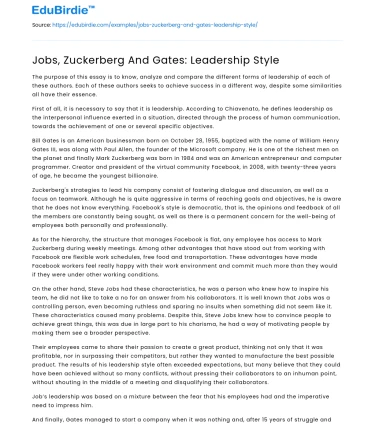The purpose of this essay is to know, analyze and compare the different forms of leadership of each of these authors. Each of these authors seeks to achieve success in a different way, despite some similarities all have their essence.
First of all, it is necessary to say that it is leadership. According to Chiavenato, he defines leadership as the interpersonal influence exerted in a situation, directed through the process of human communication, towards the achievement of one or several specific objectives.
Save your time!
We can take care of your essay
- Proper editing and formatting
- Free revision, title page, and bibliography
- Flexible prices and money-back guarantee
Bill Gates is an American businessman born on October 28, 1955, baptized with the name of William Henry Gates III, was along with Paul Allen, the founder of the Microsoft company. He is one of the richest men on the planet and finally Mark Zuckerberg was born in 1984 and was an American entrepreneur and computer programmer. Creator and president of the virtual community Facebook, in 2008, with twenty-three years of age, he became the youngest billionaire.
Zuckerberg's strategies to lead his company consist of fostering dialogue and discussion, as well as a focus on teamwork. Although he is quite aggressive in terms of reaching goals and objectives, he is aware that he does not know everything. Facebook's style is democratic, that is, the opinions and feedback of all the members are constantly being sought, as well as there is a permanent concern for the well-being of employees both personally and professionally.
As for the hierarchy, the structure that manages Facebook is flat, any employee has access to Mark Zuckerberg during weekly meetings. Among other advantages that have stood out from working with Facebook are flexible work schedules, free food and transportation. These advantages have made Facebook workers feel really happy with their work environment and commit much more than they would if they were under other working conditions.
On the other hand, Steve Jobs had these characteristics, he was a person who knew how to inspire his team, he did not like to take a no for an answer from his collaborators. It is well known that Jobs was a controlling person, even becoming ruthless and sparing no insults when something did not seem like it. These characteristics caused many problems. Despite this, Steve Jobs knew how to convince people to achieve great things, this was due in large part to his charisma, he had a way of motivating people by making them see a broader perspective.
Their employees came to share their passion to create a great product, thinking not only that it was profitable, nor in surpassing their competitors, but rather they wanted to manufacture the best possible product. The results of his leadership style often exceeded expectations, but many believe that they could have been achieved without so many conflicts, without pressing their collaborators to an inhuman point, without shouting in the middle of a meeting and disqualifying their collaborators.
Job’s leadership was based on a mixture between the fear that his employees had and the imperative need to impress him.
And finally, Gates managed to start a company when it was nothing and, after 15 years of struggle and tireless work, took off until he became the richest man in the world. To succeed, Bill Gates has used leadership styles that are based on a series of precepts that he always had in mind and knew how to capture in his life. For example, the determination. He was a man who worked tirelessly to achieve his goals. He slept little and ate fast to get more and more involved in his business.
Gates always focused his business towards the client. He knew how to discover what users really needed and give it at the right time. In addition, Gates opted for simplicity, simple solutions, together with teamwork. He was aware that without the help of the group, it was nothing. He needed constant, motivated and talented people by his side to make him increasingly competitive.
We can conclude that the three, despite everything, always look for a discipline at work. In addition, in the three it is worth mentioning their altruism and capacity for work and sacrifice, which is what has allowed the three to succeed.
BIBLIOGRAPHY
- Herrera, José. (2016). Liderazgo de gates y jobs. Scribd. https://es.scribd.com/document/313109232/Liderazgo-de-Gates-y-Jobs
- Chiiavenato, I. (2016). Concepto de liderazgo según los principales autores. Escuela Europea Management. http://www.escuelamanagement.eu/habilidades-de-liderazgo-2/concepto-de-liderazgo-segun-los-principales-autores






 Stuck on your essay?
Stuck on your essay?

